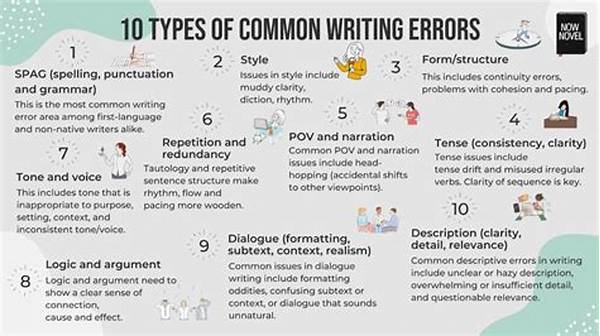Embarking on the journey of writing can be a thrilling adventure filled with creativity and self-expression. However, novice authors often encounter stumbling blocks along the way. Avoidable errors can hinder the development of a clear and impactful narrative. Recognizing these pitfalls early can be the key to flourishing as an author.
Common Missteps in Writing
Beginning writers frequently face a variety of challenges that can detract from their final product. Many of these hurdles are avoidable errors that, with a bit of attention and practice, can be sidestepped altogether.
Novice authors often struggle with overcomplicating their language. They may feel that using complex vocabulary or intricate sentence structures will enhance their writing. However, this can lead to confusion and disengagement for the reader. Instead, clarity should be the goal. Simplifying language not only makes the content more accessible but also strengthens the message.
Another common error is inconsistency in tone and style. Every writer has a unique voice, but maintaining it throughout a piece can be difficult for beginners. These avoidable errors can make a narrative feel disjointed or muddled. Consistent tone and style help in creating a cohesive and compelling story that resonates with readers.
Writing Clarity and Conciseness
For novice authors, avoiding unnecessary complexity is essential. Overly complex sentences can turn readers away. Instead, aiming for clarity and conciseness ensures the message is communicated effectively. Avoidable errors like tangled language can obstruct the reader’s understanding, making it crucial to focus on straightforward expression.
Novice writers may get trapped in the redundant elaboration of ideas. Repetition can dilute the effectiveness of the narrative. Focusing on delivering ideas succinctly keeps the reader engaged and allows the message to shine through. Identifying avoidable errors early in the writing process enhances the overall quality of the work.
Importance of Feedback
Feedback serves as an invaluable tool for authors, especially those starting out. Constructive criticism helps identify avoidable errors that may have gone unnoticed. Engaging with peers or writing groups provides diverse perspectives, aiding in refining an author’s craft. Embracing feedback as part of the journey can lead to significant improvements in writing.
It’s essential to approach feedback with an open mind. Novice authors can benefit immensely by understanding that constructive criticism is not a negative judgment but an opportunity for growth. Recognizing avoidable errors pointed out by others can accelerate the learning process and elevate an author’s skills exponentially.
The Role of Editing
Editing plays a crucial role in uncovering avoidable errors that novice authors might overlook. This stage involves reviewing one’s work critically, focusing on areas such as grammar, syntax, and overall narrative flow. Editing is not just about correcting mistakes but also about enhancing the story’s impact and readability.
1. Begin the editing process by taking a break after writing. A fresh perspective can reveal avoidable errors that were initially missed.
2. Read the work aloud. Hearing the words can highlight awkward phrasing and help maintain a natural flow.
3. Consistency in tense and perspective is vital. Shifts can confuse readers, making this a critical area to review.
4. Novice authors should check for overuse of adverbs and adjectives. Strong verbs can often convey the message more effectively.
5. Editing is iterative. Multiple rounds are often necessary to ensure all avoidable errors are addressed, resulting in polished and compelling writing.
Building a Writing Routine
Establishing a consistent writing routine can help novice authors reduce avoidable errors over time. Writing regularly hones an author’s skill, making it easier to spot and correct common mistakes. This discipline not only builds confidence but also fosters a deeper connection with the craft.
A structured routine provides a framework for developing ideas and refining writing techniques. By dedicating specific time slots for writing, novice authors can focus on producing quality content without distractions. This regular practice makes it easier to identify and address avoidable errors before they become ingrained habits.
Setting achievable goals within this routine is important. Progress may be slow initially, but persistence is key. Novice authors will find that as they continue to write consistently, their ability to recognize and eliminate avoidable errors naturally improves. Over time, this practice leads to more sophisticated and polished works of writing.
Embracing the Writing Process
Understanding that writing is a process, not just a finished product, can alleviate pressure and allow novice authors to thrive. Each stage, from brainstorming to drafting to editing, presents an opportunity to learn and grow. Emphasizing the process helps authors to be patient and forgiving with themselves.
Recognizing avoidable errors as stepping stones rather than obstacles can shift the mindset from frustration to motivation. Each error is a chance to refine skills and strengthen narrative abilities. Embracing mistakes as part of the learning process enables novice authors to develop a resilient and adaptive approach to writing.
Ultimately, the path to becoming a seasoned author is personal and unique. Avoidable errors will be part of the journey, but they need not deter aspiring writers. Through dedication, practice, and a willingness to learn, these errors become powerful tools for growth, leading to a rewarding and fulfilling writing career.
Conclusion
Avoidable errors for novice authors can be seen as integral to the learning process. Understanding and addressing these errors leads to more engaging and compelling writing. Novice authors should remember that the journey is as important as the destination. Embracing every aspect, including the mistakes, enriches the narrative craft.
As authors continue to cultivate their skills, they will find their unique voice and style. Persistent practice and openness to feedback are key in overcoming avoidable errors. In doing so, novice authors not only enhance their writing but also discover the joy and satisfaction of effective storytelling, creating works that resonate deeply with readers.
